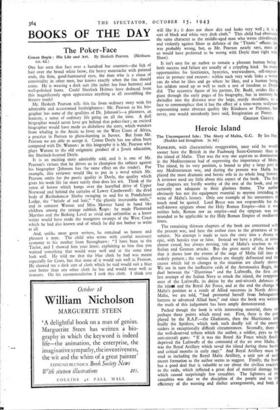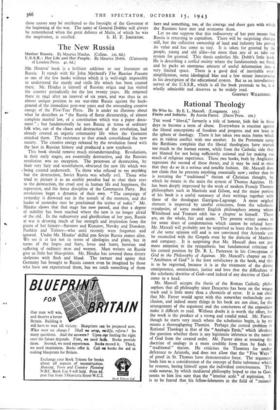Heroic Island
The Unconquered Isle : The Story of Malta, G.C. By Ian Hay, (Hodder and Stoughton. 7s. 6d.)
NAPOLEON, with characteristic exaggeration, once said he would sooner have the British in the Faubourg Saint-Gennain than in
the island of Malta. That was the way one aspirant to domination in the Mediterranean had of expressing the importance of Malta. The island, by its very position, is bound to play a large part in any Mediterranean war, and during the present war Malta has played the most dramatic and heroic role in its whole long history. A reviewer need say little about this aspect of the book. The first four chapters are hardly worthy of the rest of the book, and are
certainly not adequate to their glorious- theme. The author obviously has not the equipment essential to anyone intending to write of Malta's history. Only one example of his unsureness of touch need be quoted. Lord Bryce was not responsible for the well-known epigram about the Holy Roman Empire—that it was neither holy, Roman nor an empire—and the epigram was not intended to be applicable to the Holy Roman Empire of mediaeval times.
The remaining thirteen chapters of the book are concerned with the present war, and here, the author rises to the greatness of his subject. No attempt is made to turn the story into a drama or epic, with heroics true or false. Instead we have a plain, at times almost casual, but always moving, tale of Malta's reaction to the Italian and German attacks. But the great merit of the book i that it shows how the events of the siege of Malta fall into an orderly pattern ; the various phases are sharply delineated and the causes which led to changes in the situation are dearly shown We see in turn the ineffective raids of the Aeronautica Regia, the duel between the ' Illustrious ' and the Luftwaffe, the first and last attempt of the Italian Navy to attack the island, the reappear ance of the Luftwaffe, its defeat by the anti-aircraft defences o the island and the Royal Air Force, and at the end the change Malta's position as a result of Allied successes in North Africa Malta, we are Aoki, "had promoted herself from . beleaguere fortress to advanced Allied base," and since the book was writte the truth of this judgement has been amply demonstrated.
Packed though the book is with interesting material, there ar perhaps three points which stand out. First, there is the part played by the R.A.F.—the Gladiators, then the Hurricanes an finally the Spitfires, which took such deadly toll of the enemy raiders in exceptionally difficult circumstances. Secondly, there is the well-deserved tribute which the author, a soldier, pays to the anti-aircraft guns: " If it was the Royal Air Foxce which finally deprived the Luftwaffe of the command of the air over Malta, was the Royal Artillery which saved the island during those heal and critical months in early 1942." And Royal Artillery must be read as including the Royal Malta Artillery, a unit not of such recent formation as the author seems to suggest. Finally, the book has a good deal that is valuable to say about the civilian reactio to the raids, which inflicted a great deal of material damage bu which caused surprisingly few casualties. The lightness of th casualties was due to the discipline of the people and to th efficiency of the warning and shelter arrangements, and both o
these causes may be attributed to the foresight of the Governor at the beginning of the war. The name of General Dobbie will always be remembered when the great defence of Malta, of which he was



























 Previous page
Previous page